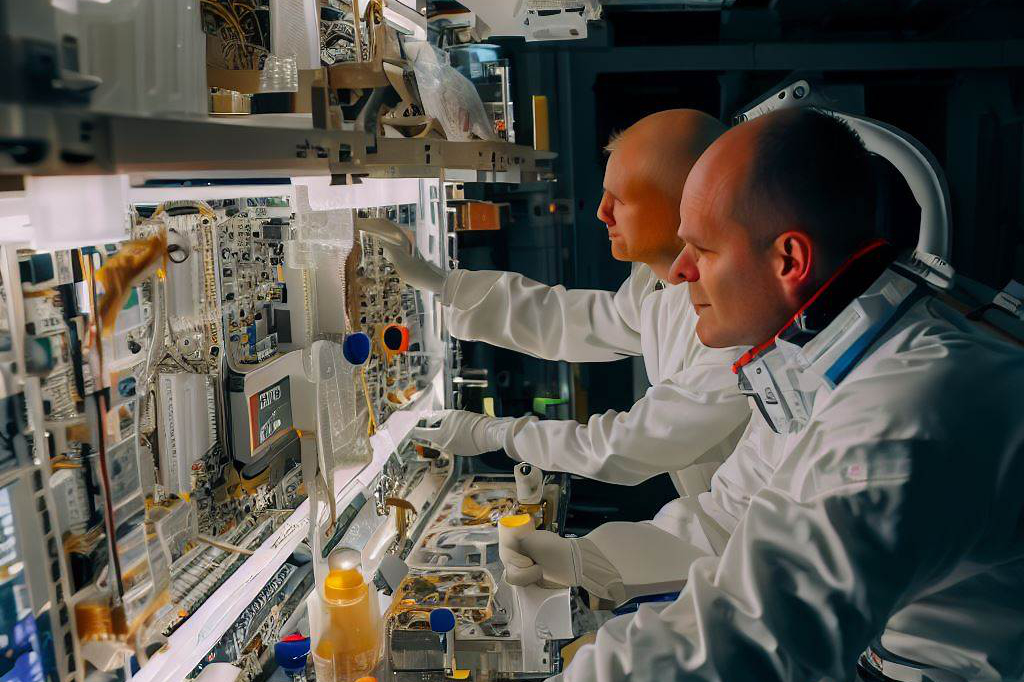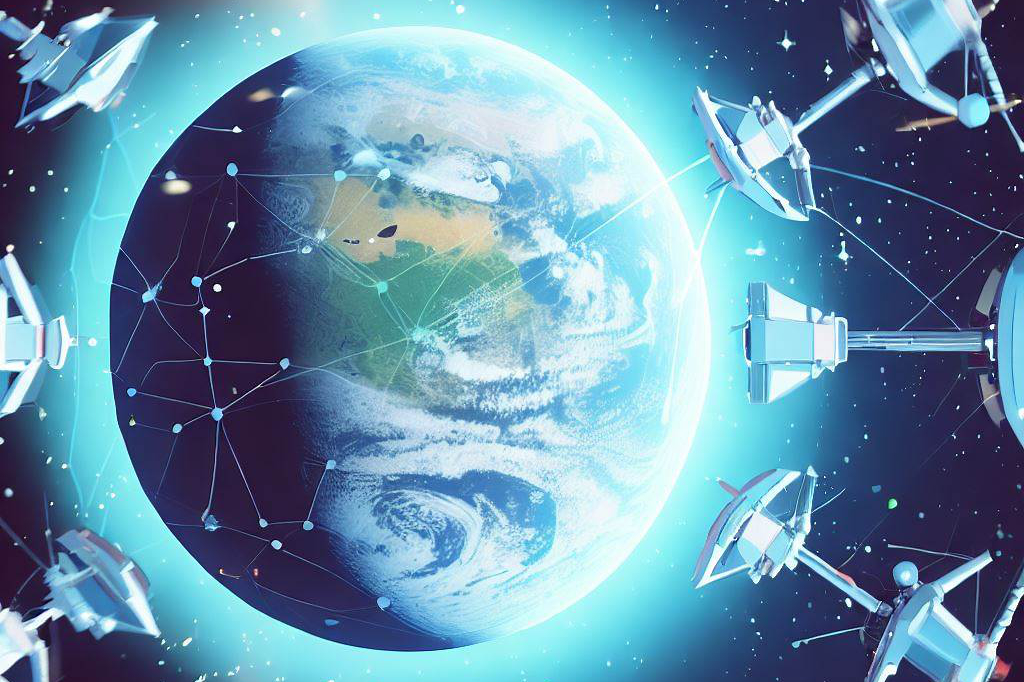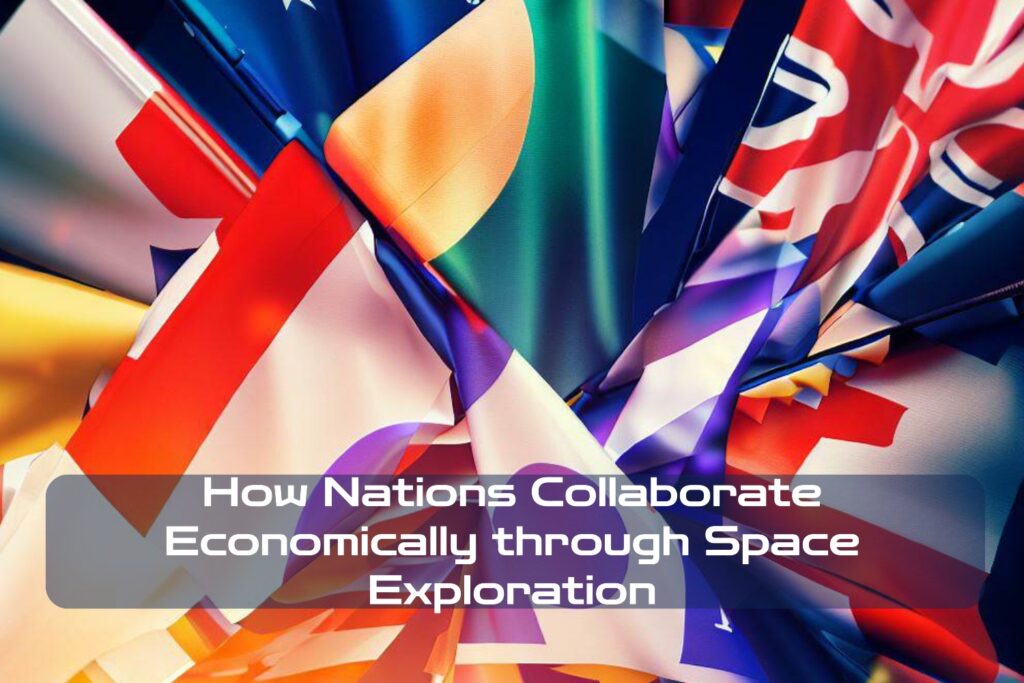Space exploration has been a critical aspect of scientific discovery and technological advancement for decades. It is an endeavor that requires significant investment in terms of resources, expertise, and funding. The exploration of space has been recognized as a means of improving human life on Earth through discoveries made in areas such as medicine, climate change, and energy.
Additionally, space exploration creates job opportunities and fosters economic growth. The significance of space exploration can be seen through the achievements made by nations so far.
Manned missions to the Moon by the United States in the 1960s and 70s sparked global interest in space exploration. This was followed by international collaboration on projects such as the International Space Station (ISS) which involved countries from Europe, Russia, Japan, Canada, and the United States working together towards a common goal.
The International Space Station: An Example of Economic Collaboration in Space Exploration

The International Space Station is arguably one of the most significant collaborative efforts between nations in space exploration history. First launched into orbit in 1998, it has been continuously inhabited since then by astronauts from different countries who work together to conduct scientific research and experiments.
One key benefit that comes with participating in this program is cost-sharing among nations, which makes it more affordable than having individual countries launch their own programs. Each nation contributes different expertise and funding to maintain the station’s operations, which allows for shared use as well.
Beyond being a laboratory for scientific collaboration among nations, ISS also serves as an important platform for technology development with applications back on earth– from materials science to fuel cells – thanks to its micro-gravity environment, which offers scientists unprecedented testing possibilities outside the earth’s atmosphere.
The ISS serves as an example not only of how nations can achieve great things when working together but also of how they can use this type of collaboration to create stable economic relationships that foster technological advancements and shared benefits.
Economic Benefits of Space Exploration
Space exploration is not only about discovering the unknown and answering fundamental questions about the universe, but also about economic benefits for nations. The potential economic impact of space exploration is staggering, with job creation, technological advancements, and resource discovery being just some of the benefits that nations stand to gain from investing in space exploration programs.
Job Creation
One of the most significant economic benefits of space exploration is job creation. Space programs require a highly skilled workforce ranging from engineers to scientists, technicians, and support staff.
These jobs are often high-paying and can create a positive ripple effect in local economies as new businesses move into the area to support these workers. Furthermore, space programs provide opportunities for education and inspire students to pursue careers in science, technology, engineering, and mathematics (STEM), which can help bridge a skills gap in these fields.
Technological Advancements
Space exploration has been driving technological advancements for decades. From developing more efficient rockets to creating advanced materials that can withstand extreme temperatures and radiation in space, these technologies have applications beyond just space exploration.
For example, advances made in satellite technology have transformed communication systems on Earth while advances in medical research have led to improved healthcare outcomes for patients suffering from conditions such as osteoporosis. Beyond this direct impact on our day-to-day lives through new products or services made possible through technological advancements created by space research; there are also broader impacts such as increased international cooperation between countries involved in exploring outer space or international peacekeeping missions.
Resource Discovery
The discovery of resources outside our planet could potentially revolutionize industries on Earth – from mining raw materials on asteroids or other planets to harnessing solar power beyond our atmosphere. This could lead to better energy sources that are cheaper and more sustainable and reduce our reliance on finite resources on Earth, making it possible to support population growth for years to come. Additionally, resource discovery in space could create new jobs around extracting and processing these resources, driving economic growth and development.
The economic benefits of space exploration are vast, ranging from job creation to technological advancements to resource discovery. As we continue exploring beyond our planet’s boundaries, we are opening up new opportunities for economic progress that will not only benefit current generations but also those in the future.
Collaborative Efforts in Space Exploration

Space exploration is a field that requires significant resources and expertise. It is often too costly for any single nation to undertake alone.
For this reason, nations often collaborate in their space exploration efforts to share the costs and benefits of these endeavors. There are many examples of collaboration in space exploration throughout history, but one of the most prominent is the International Space Station (ISS).
Overview of how nations collaborate in space exploration efforts
There are many ways that nations can collaborate in space exploration. These include sharing scientific data and research findings, providing funding for joint missions, working together to develop new technologies, and sharing infrastructure such as launch sites or communication networks.
Collaborations between nations can be formal or informal and can be driven by scientific goals or geopolitical objectives. One key benefit of collaboration is that it allows nations to pool resources and expertise to achieve shared objectives that they may not be able to achieve alone.
Additionally, collaborations can help reduce costs by spreading them across multiple partners. Collaborations can help build relationships between nations, which can lead to further cooperation on other issues.
Explanation of the ISS as a collaborative effort between multiple nations
The International Space Station (ISS) was launched into orbit in 1998 as a joint project between five different space agencies:
The construction of the ISS required significant cooperation among these agencies, including the design and development of modules that could be assembled in orbit. One unique aspect of the ISS is its international crew.
Astronauts from different countries work together on board the station, conducting scientific experiments and performing maintenance tasks. This multinational crew reflects the collaborative nature of the project itself.
How the ISS is used for scientific research and experimentation

The ISS is primarily used as a research facility, with experiments conducted in fields such as biology, physics, and astronomy. The microgravity environment of the ISS allows scientists to conduct experiments that are not possible on Earth.
For example, researchers have used the ISS to study the effects of long-term spaceflight on human health and to investigate ways to grow plants in space. The international nature of the ISS has also allowed for unique collaborations between nations on scientific projects.
For example, Russian and American astronauts have worked together to conduct joint research on materials science and fluid dynamics. Additionally, some experiments on board the ISS are collaborative efforts between multiple countries.
Overall, the collaboration required for space exploration often leads to significant scientific advancements and economic benefits for participating nations. The International Space Station is just one example of how countries can work together towards a common goal in space exploration.
Economic Impact of the ISS

Unleashing Economic Benefits through ISS Collaboration
The International Space Station (ISS) is a prime example of successful economic collaboration in space exploration. The joint efforts by participating nations have led to several economic benefits, including technological advancements in space research and development, job creation, and resource discovery.
These benefits have had a profound impact on the participating nations’ economies. Job creation is one of the most significant economic impacts of the ISS program.
The construction and maintenance of the ISS require a highly skilled workforce that spans different industries such as engineering, science, and technology. According to NASA estimates, the ISS program has created over 100,000 jobs across different countries since its inception.
Technological Advancements from ISS Program
The technological advancements made through the ISS program have proved invaluable for participating nations. These advancements are not limited to space exploration but also extend to other fields such as medicine and manufacturing. Collaboration among scientists from different countries has led to breakthroughs in cancer research and the development of new vaccines and medicines for various diseases like Parkinson’s disease, Alzheimer’s disease, among others.
Furthermore, companies have greatly benefited from technological advancements in manufacturing processes developed through collaboration on the ISS. For instance, 3D printing technology developed through experiments on board has revolutionized manufacturing by reducing production costs by up to 70% while increasing efficiency.
Collaboration for Resource Discovery
Another economic impact of collaborative space exploration efforts is resource discovery. The partnership between Japan and NASA on the Kibo module aboard the ISS has led to several discoveries that could be valuable resources for future missions, such as rare earth metals essential in electronic manufacturing.
These discoveries could lead to increased demand for these resources and opportunities for mining companies based on Earth, leading to an increase in revenue generation and thus boosting their economies. It is clear that the economic impact of the ISS program has been significant, providing job opportunities, and technological advancement in fields such as medicine and manufacturing.
The program’s partnership has also led to resource discovery with the potential for future revenue generation. It is a testament to how nations can collaborate to achieve great things, not only for us but also for future generations who will benefit from these advancements.
Challenges Faced in Collaborative Space Exploration

Collaborating in space exploration efforts is not always easy, and there are several challenges that must be overcome for nations to work together effectively. These challenges can range from language barriers to cultural differences and political tensions. In this section, we will explore some of the main challenges faced by nations when collaborating on space exploration projects.
Language Barriers
One of the most significant challenges faced by nations when collaborating on space exploration projects is language barriers. Different countries speak different languages, and this can make it difficult for scientists and engineers to communicate effectively with one another. Misunderstandings can lead to mistakes that could have serious consequences.
To overcome language barriers, many international space programs rely on translators and interpreters. NASA, for example, employs a team of interpreters who are responsible for facilitating communication between astronauts from different countries while they are working together in space.
Cultural Differences
Cultural differences can also create challenges for collaborative space exploration efforts. Different cultures have different ways of working and communicating, which can lead to misunderstandings and conflicts if not properly addressed.
To navigate these cultural differences successfully, participants in international space programs often undergo cultural sensitivity training before beginning their work on a project. This training helps individuals understand the customs and traditions of other cultures so they can better communicate with one another.
Political Tensions
Political tensions between nations can also create significant challenges for collaborative space exploration efforts. Competing interests or ongoing conflicts may make it challenging for governments to work together effectively on a project without interference or political tensions affecting the collaboration’s outcome.
However, despite these challenges’ existence, many international collaborations have proven successful in overcoming them through diplomatic negotiations and establishing shared objectives that prioritize scientific advancement above politics or national interest. Ultimately, such successful collaborations demonstrate how important cooperation is in achieving significant progress in space exploration and beyond.
Future Collaborative Efforts in Space Exploration

Exploring New Frontiers Together
As we continue to discover the benefits of space exploration, it becomes increasingly clear that collaboration is essential to making further progress. Future endeavors in space will require collaboration not just among government agencies, but also between private companies and research institutions.
Some potential areas for future collaboration include asteroid mining, space tourism, and deep-space exploration.
One example of a potential future collaborative effort is the proposed Lunar Gateway project, which would involve building a lunar-orbiting facility to serve as a staging point for future missions to the moon.
The project is being led by NASA with contributions from international partners such as Canada, Europe, and Japan. The Lunar Gateway would provide valuable opportunities for scientific research and commercial ventures in space.
Overcoming Challenges through Collaboration
Collaboration in space exploration has never been easy, and there will undoubtedly be challenges ahead. Differences in language, culture, political ideology, and budget constraints are just some of the obstacles that must be overcome.
However, by working together toward common goals, nations can pool their resources and expertise to achieve more than any one country could alone. One area where collaboration will be especially important is in developing new technologies for space exploration.
Private companies such as SpaceX and Blue Origin have already made significant strides in this area with reusable rockets and spacecraft. However, government agencies will also need to invest in new technologies such as advanced propulsion systems and radiation shielding.
The Importance of Collaboration for Global Unity
Collaboration in space exploration not only leads to economic benefits but also promotes global unity through peaceful cooperation. The ISS program has been cited as a shining example of how nations can work together toward common goals despite political differences on Earth.
As we look ahead to future missions beyond Earth’s orbit – whether it’s returning humans to the moon or exploring Mars – collaboration will be essential to ensure that we continue to push the boundaries of what’s possible in space. Ultimately, by working together in space, we can achieve something greater than any one country could on its own – a brighter future for all of humanity.
Final Thoughts

We have explored how nations collaborate economically in space exploration, using the International Space Station (ISS) as the main example. The economic benefits of space exploration are vast and varied, ranging from technological advancements to job creation and resource discovery. Collaborative efforts in space exploration are essential for achieving these benefits and maximizing outcomes.
The ISS is a prime example of international cooperation in space exploration, with multiple countries contributing both financially and materially to its construction and maintenance. This collaboration has led to significant scientific research being conducted aboard the station, leading to groundbreaking discoveries and advancements in fields such as medicine, biology, physics, and astronomy.
While challenges exist when attempting collaborative efforts in space exploration due to language barriers, cultural differences, and political tensions, these obstacles can be overcome with proper planning, and communication protocols, among others. Collaborative ventures such as the ISS have shown that nations are capable of working together towards a common goal when necessary.
As we look towards future missions beyond low Earth orbit or back to the Moon or Mars, collaborations will play a crucial role. We must continue to embrace collaboration between nations if we hope to make significant strides in space exploration.
By doing so, we can expect more exciting discoveries coming our way which will not only benefit us on earth but also pave the way for human beings’ expansion into other worlds. : By collaborating economically through initiatives like the ISS program that allows joint operations between multiple countries, we can help achieve our most ambitious goals for humanity’s future beyond planet Earth while also benefiting us directly here on Earth in ways that may not yet be fully understood or appreciated by everyone.
TL;DR…
– 🔭 The International Space Station (ISS) serves as an example of economic collaboration in space exploration.
– 🌍 Space exploration provides economic benefits such as job creation, technological advancements, and resource discovery.
– 🚀 Collaborative efforts in space exploration involve multiple nations working together for scientific research and experimentation.
– 💼 The ISS collaboration has unleashed economic benefits and led to technological advancements.
– 🌌 Challenges in collaborative space exploration include language barriers, cultural differences, and political tensions.
– 🌐 Future collaborative efforts in space exploration aim to explore new frontiers, overcome challenges, and promote global unity.

C M, a seasoned editor, journalist, and consultant, is deeply fascinated by the convergence of technology, space, and the future of humanity.
With a particular interest in transhumanity, futurology, and the philosophical and ethical dimensions of these domains, C M serves as the lead contributor to SpaceSpotlight and TranscendSphere.
When not penning insightful articles on these rapidly evolving fields, C M indulges in their love for podcasts and books, proudly embracing their status as a ‘Happy Nerd Extraordinaire!’



